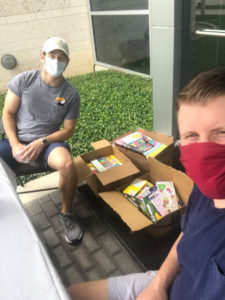TCOM students organize toy drive for survivors of human trafficking
Human trafficking is a $150 billion business and growing every day. When COVID-19 started spreading across the globe, survivors weren’t spared.
So students from the Texas College of Osteopathic Medicine saw an opportunity to help.
TCOM third-year student Jacob Freudenberger and members of TIME (Trafficking in Medical Education), a non-profit organization, started working with the advocacy group Unbound, which is fighting human trafficking through prevention, awareness and professional training.
They came up with the idea of hosting a Toy Drive, which recently collected toys, donations and other gifts like puzzles and coloring books to help the children of the victims of human trafficking.
“The response regarding the COVID toy drive has been absolutely incredible,” Freudenberger said. “We have received about $450 in donations, which we used to make a big order of toys and gifts and have had a large set of donations of items from people.”
Freudenberger said he and his fellow members of TIME are trying “to encourage the integration of human trafficking education in medical curricula across the board so people are better prepared to recognize and respond to what is really a much bigger issue than a lot of people realize.”
“We are also working on research to shed light on how little the medical field is being educated on this subject as well as reaching out to state and national officials to encourage change on a larger scale,” he said.
The statistics regarding human trafficking are sobering. Worldwide, there are over 40.3 million victims of human and sex trafficking. Being able to recognize potential warning signs and risk factors are important for those in the medical community as they are often the first line of defense for victims.
“Being able to recognize a potential victim of human trafficking in the healthcare setting, then properly alerting the authorities is extremely important in the process of helping identify traffickers or larger human trafficking rings,” he said. “If we can educate kids at a young age how to be on the lookout for traffickers, I think we can vastly reduce the supply of victims. The bottom line is education is key.”







Social media